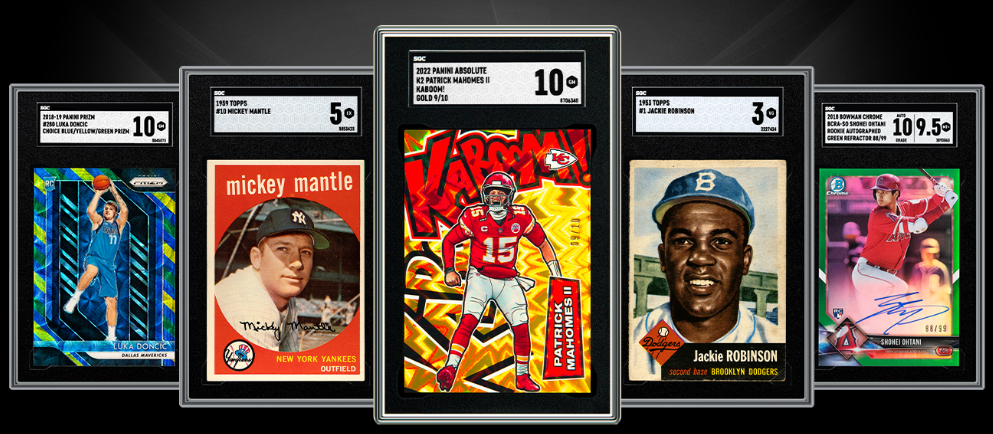In the sports card hobby, collectors understand the value of grading cards. While professional grading services are an expense, they offer perks such as authentication and protection, enhancing a card’s resale value. As 2024 unfolds, I find the community frequently discusses two competing approaches. On one hand, many collectors seek professional services to grade their prized cardboard treasures, from baseball to basketball, to TCG cards. On the other, a segment of the community leans towards innovative online resources and do-it-yourself techniques. These mechanisms promise a no-cost estimate of a card’s condition, which can be a stepping stone to decide if professional grading is worth the investment.
My experience with grading underscores its pivotal role in confirming a card’s authenticity and preserving its state. Rather than investing immediately in pro services, I often advise enthusiasts to utilize online tools. They can provide a reasonable estimate of a card’s grade without upfront costs, revolutionizing the practice with the aid of artificial intelligence. When dealing with companies renowned for grading, such as PSA or BGS, it’s crucial to acknowledge that the added trust and cardboard safeguarding they offer come with a price tag. Yet, understanding the importance of card grading is essential for grasping the full picture of collecting sports trading cards.
Key Takeaways
- Professional card grading entails added benefits but cannot be obtained freely.
- Online tools can estimate a card’s grade at no cost, aiding collectors in decision-making.
- Understanding the intricacies of card grading is crucial for sports card enthusiasts.
Can You Grade Sports Cards For Free?
While professional grading companies such as PSA (Professional Sports Authenticator), BGS (Beckett Grading Services), and SGC (Sportscard Guaranty Corporation) provide a valuable service, getting a card professionally graded comes at a cost. These entities charge for card grading because the resulting graded cards often significantly increase a card’s resale value. The increase in value is due to the authenticity and condition verification that comes with a graded card’s slab/label. Individuals sometimes believe they can circumvent these fees, but in reality, these services are never completely free.
Despite this, grading isn’t strictly limited to paid services. Sports card grading, at its core, involves the physical inspection and evaluation of the card in question. Cards are typically assessed on a grading scale ranging from 1 to 10, with PSA 3 indicating a card in VG (Very Good) condition and higher numbers pointing to a better state.
Here are some alternatives for grading cards without incurring professional fees:
- Self-Inspection: You can assess your own cards using the grading scales provided by the companies above. This method won’t be as authoritative but can give you an estimate of where your card might fit on the grading spectrum.
- Online Tools: Some free online resources offer rudimentary guides or tools to help estimate the grade of a card.
- Community Guidance: Engaging with the sports card community can provide insights and unofficial evaluations, which might assist you in judging the condition of your cards.
Remember that while self-grading can give you an approximation, it lacks the official recognition that professional grading provides, which is often crucial in influencing a card’s book value and resale value. If you decide to sell your cards, professionally graded cards from PSA, BGS, or SGC will typically hold more value than self-graded cards.
Table Grading Scales: Commonalities and Differences
| Grade | PSA | BGS | SGC |
|---|---|---|---|
| 10 | Gem Mint | Pristine | Gem Mint |
| 9 | Mint | Mint | Mint |
| 8 | NM-MT | NM-MT | NM/MT |
| … | … | … | … |
| 3 | VG | Very Good | Good |
| 1 | Poor | Poor | Fair |
Note: Grading scales may have half-points or sub-grades for more nuanced evaluations.
Remember, every modern grading system or scale by SGC, CSG (Certified Sports Guaranty), or Beckett offers a framework through which cards can be evaluated, but the official seal of quality from these companies plays a significant role in a card’s perceived market value.
The Benefits Of Paid Professional Card Grading
As a card grading connoisseur, I’m well-acquainted with the merits of professional card grading. Here’s a snapshot of the advantages:
- Security: Once I send my card for grading, it’s placed in a durable, sealed slab. This isn’t just for show; it’s a fortress against wear and tear, ensuring my card stays in mint condition.
- Authenticity: The grading process isn’t just about slapping on a grade; it’s a thorough authentication check. This gives me peace of mind that what I own is the real deal and not a clever fake.
- Value-Appreciation: Those numbers – be it BGS 9, PSA 9, or the elusive PSA 10 – carry weight in the collecting world. A slabbed, high-grade card can command prices many times that of its raw counterpart.
- Consistency: Grading isn’t arbitrary. It follows a consistent, standardized set of criteria, so when my card earns a grade, I trust it’s been through a rigorous evaluation.
Having used these services, I’ve experienced firsthand the reduced wait times and varying service levels. I know the grading service level I choose determines how quickly my gems return to me, duly judged and encased for their protection and provenance.
Card Grading for Free: DIY and Online Resources
Why Self-Grade A Sports Card?
When it comes to assessing the condition of sports cards in my collection, I look at several factors, including centering, corners, edges, and the surface. Self-grading offers a good starting point before considering professional grading companies. One of the obvious benefits is cost-efficiency – I don’t have to pay a fee for each card I assess. This is especially helpful if I’m not looking to sell or if I’m checking for authenticity. The condition can range from poor to gem mint, and understanding the subtleties of each grade helps me decide if seeking a professional grade is worth the investment.
Having a fair idea about the grade a card may receive from PSA, BGS or SGC helps me understand potential market value. If the expected value in a particular grade justifies the grading cost and anticipated waiting times, then I consider sending it in for official grading. If the card is likely to be in excellent-mint condition or higher, it may be worthwhile. Conversely, a card appearing to be in good condition might not benefit as much from expensive grading services.
Free Online Tools To Use For Card Grading
Analyzing your cards against benchmarks set by grading services like PSA’s grading scale affords a clearer picture of where your card stands. The PSA Photograde online tool allows me to compare my cards with high-quality images across grading categories. Understanding why a card receives a certain grade through visual comparison is invaluable when I self-grade my vintage cards or newer issues.
For parameters such as centering, which influences the overall grade significantly, I have utilized the Card Centering Calculator | Sports & Trading Cards. By uploading a card’s image, I receive a calculated centering score indicative of a PSA or BGS centering subgrade. Sometimes, I also resort to a traditional ruler for a manual check when digital tools are not handy.
Finally, sharing images of my sports cards with the community on forums and receiving feedback can be insightful. Experienced collectors can offer a second opinion, solidifying my understanding of how my card might fare with professional grading services. A consensus can also flag any overlooked flaws such as subtle creases or scratches, ensuring my self-grade is as accurate as possible.
Collectively, these steps bolster my confidence in my grading capabilities and save me money when having all my cards professionally graded isn’t necessary. They also prime me for the black label, or gem mint grade, pursuit when I’ve got a sports card that seems exemplary. With this process, I can aptly determine when it’s advisable to aim for that top-tier, card-boosting slab from a leading grader.
Frequently Asked Questions
What are the options for free card grading assessments online?
- PSA Photograde: PSA offers an online resource called PSA Photograde, where I can compare my cards to high-resolution card images.
- Beckett: Beckett provides a raw card review service that offers a preliminary grade, which can be free if I attend Beckett-sponsored events.
How can I determine the centering of my sports cards without cost?
- Edge Grading Centering Tool: I can use a printable centering tool available online to measure the borders.
- Digital Caliper: If I own a digital caliper, I can measure the card’s centering myself at no cost.
Are there any tools available for grading sports cards free of charge?
- Apps: Some mobile apps offer basic card grading tools for free. Examples include the PSA Certification Verification app or the Card Ladder.
- Online Guides: Websites like PSA Card offer comprehensive grading standards I can study.
Which apps offer free valuation for sports cards?
- eBay: By searching sold listings on eBay, I can gauge the market value of similar cards.
- CollX: CollX is an app that can scan cards and provide instant estimated values.
What is the most cost-effective method for having my sports cards graded?
- Group Submissions: I can save on grading fees by joining group submissions where many collectors combine their submissions.
- Waiting for Specials: Companies like PSA and Beckett occasionally offer discounts and specials on grading fees.
How can I grade my sports cards at home using free resources?
- Online Tutorials: There are free online tutorials and videos that teach grading techniques.
- Comparison Charts: Grading companies provide charts and guides that help I compare the condition of my cards to predefined grading standards.

Hi there! I’m Felix Gonzalez and I am the owner of Card Collecting Insider, and I’m thrilled to welcome you to my site! With our tagline “Uncover the Art of Collecting, One Card at a Time,” I’m here to provide you with expert insights, valuable resources, and the latest trends in the world of card collecting. Whether you’re a seasoned collector or just starting out, I’m dedicated to helping you discover hidden gems and sharing insider tips to elevate your collection. So join me on this exciting journey, as I dive deep into the captivating realm of card collecting. Let’s unlock the true beauty of these collectible treasures together!

